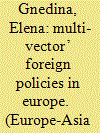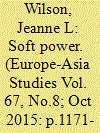| Srl | Item |
| 1 |
ID:
141270


|
|
|
|
|
| Summary/Abstract |
The article examines the phenomenon of ‘multi-vector’ foreign policies that have been adopted by a variety of states in Russia and the EU common neighbourhood. It traces the origins of ‘multi-vector’ foreign policy to a series of asymmetric bargaining ‘games’ between smaller states and two competing regional powers over the terms of cooperation. During these bargaining games, they either accommodate the demands of more powerful actors to relieve external pressure, or manoeuvre between two external actors to extract concessions from and negotiate more favourable agreements with one or both. The model illustrating how ‘multi-vector’ states behave is tested in the case of Ukraine's energy policy in the period from 1999 to 2009.
|
|
|
|
|
|
|
|
|
|
|
|
|
|
|
|
| 2 |
ID:
141799


|
|
|
|
|
| Summary/Abstract |
Despite the continuing growth of internet use in Russia, there remains little systematic analysis of online election campaigning. This article presents an in-depth, multi-method analysis of party and candidate online activity during the 2011 State Duma election campaign—arguably Russia's first ‘internet election’—to ascertain the extent to which new social media is changing politics in Russia. The main findings indicate that the internet did indeed help to level the competitive playing field during the election campaign period, but despite the growing number of internet users, the overall level of online engagement remained weak.
|
|
|
|
|
|
|
|
|
|
|
|
|
|
|
|
| 3 |
ID:
141801


|
|
|
|
|
| Summary/Abstract |
This article examines whether fiscal decentralisation in the former Yugoslav Republic of Macedonia between 2005 and 2012 has been achieved at the expense of economic and territorial cohesion. It examines the presence of longstanding socioeconomic disparities and rural under-development, before considering whether fiscal decentralisation has: facilitated a more equitable distribution of public resources; created the optimal conditions for expanding citizens’ access to basic services; and reduced socioeconomic disparities between urban and rural areas. The article argues that unless carefully designed and implemented, fiscal decentralisation reforms can have unintended consequences and may actually exacerbate socioeconomic disparities rather than reduce them.
|
|
|
|
|
|
|
|
|
|
|
|
|
|
|
|
| 4 |
ID:
141800


|
|
|
|
|
| Summary/Abstract |
This study develops and tests two arguments for how repertoires of political action are reconfigured in post-communist Romania. Using multivariate statistical analysis, it examines whether citizens' engagement in post-communist politics is linked with generic socioeconomic and attitudinal traits or, alternatively, if it is connected with selective mobilisation opportunities provided by social networks and organisations. The findings reveal that while most Romanians are politically inactive two decades after the fall of communism, those who engage in politics do so selectively and their political action repertoires are largely influenced by four mobilising agents: trade unions; political parties; social networks; and civil society organisations.
|
|
|
|
|
|
|
|
|
|
|
|
|
|
|
|
| 5 |
ID:
141798


|
|
|
|
|
| Summary/Abstract |
This article examines the recent emergence and growth of grassroots social movements in Armenia which are locally known as ‘civic initiatives’. It considers what their emergence tells us about the development of civil society and the changing understandings and practices of citizenship in Armenia in the post-Soviet period. It analyses why civic initiatives explicitly reject and distance themselves from formal, professionalised NGOs and what new models of civic activism and citizenship they have introduced. It argues that civic initiatives embrace a more political understanding of civil society than that which was introduced by Western donors in the 1990s.
|
|
|
|
|
|
|
|
|
|
|
|
|
|
|
|
| 6 |
ID:
141797


|
|
|
|
|
| Summary/Abstract |
This article compares soft power as a normative and operational construct in the Russian and Chinese political context. I examine Russian and Chinese discourse on soft power as well as the efforts of the Kremlin and Beijing to devise programmes for its implementation. I then compare and evaluate the similarities and differences in Russian and Chinese soft power strategy. The similarities between the two states indicate their joint status as authoritarian regimes with a Marxist–Leninist heritage. The differences can be attributed to their vastly disparate economic circumstances, but also to historical, social, and political factors that influence soft power policies.
|
|
|
|
|
|
|
|
|
|
|
|
|
|
|
|
| 7 |
ID:
141802


|
|
|
|
|
| Summary/Abstract |
The article identifies an emerging trend in the reconstruction of identities in the Balkans which involves the memorialisation of foreign celebrities, including Rocky Balboa, Tarzan, Bruce Lee, Bob Marley, Tupac Shakur, and Samantha Fox. The article aims to understand the meaning and the purpose of foreign celebrity monuments to the local communities. The findings suggest that the monuments represent radical political statements by emerging civil societies in a process of transition from Yugoslav socialism, 1990s nationalism, and foreign-led liberalisation and democratisation in post-conflict times. The monuments are constitutive in themselves as democratic expressions and examples of citizens performing political acts.
|
|
|
|
|
|
|
|
|
|
|
|
|
|
|
|